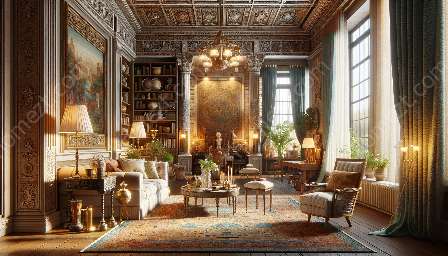Textile production and consumption have significant ethical and social implications, which intersect with the world of interior design and styling. This article explores the multifaceted aspects of textile production and consumption, their compatibility with textiles and fabric in interior design, and the impact on interior design and styling.
Understanding Textile Production and Consumption
Textile production involves the processes of creating fabrics and materials used in various industries, including fashion, interior design, and more. Simultaneously, textile consumption refers to the purchase, use, and disposal of textile products by consumers.
Understanding the ethical and social implications of textile production and consumption requires analyzing various factors, including labor practices, environmental impact, supply chain transparency, and consumer behavior.
Ethical Considerations in Textile Production
When discussing ethical implications, it's essential to consider the labor practices involved in textile production. The industry often faces challenges related to fair wages, working conditions, and child labor. Ethical textile production aims to uphold labor standards, ensure fair treatment of workers, and promote safe working environments.
Additionally, ethical considerations encompass the environmental impact of textile production, such as water and energy usage, chemical emissions, and waste management. Sustainable practices, including utilizing eco-friendly materials, reducing water consumption, and implementing efficient waste management, are crucial for ethical textile production.
Social Implications of Textile Consumption
Textile consumption is closely tied to consumer behavior, trends, and societal norms. The fast fashion industry, for example, often leads to high consumption and disposal rates, contributing to environmental pollution and waste. Social implications encompass the influence of consumer choices on sustainable and ethical practices, as well as the impact of fashion and textile trends on cultural values and perceptions.
Furthermore, textile consumption raises awareness about the importance of conscious consumerism, encouraging individuals to make informed choices that align with ethical and sustainable values.
Textiles and Fabric in Interior Design
The use of textiles and fabric is fundamental in interior design and styling, as they contribute to the aesthetic appeal, functionality, and comfort of a space. Textiles play a crucial role in enhancing the visual and tactile experience of interior environments, making them integral to the design process.
Interior designers and stylists integrate textiles and fabric through upholstery, drapery, rugs, and soft furnishings to create cohesive and inviting spaces. The choice of textiles reflects the overall design concept and influences the ambiance, mood, and functionality of the interior.
Compatibility of Ethical Textile Production in Interior Design
Integrating ethical textile production in interior design aligns with the principles of sustainability, responsibility, and conscious design. Designers and manufacturers increasingly prioritize ethical sourcing, production, and material choices to minimize environmental impact, support fair labor practices, and promote transparency in the supply chain.
By selecting ethically produced textiles, interior designers can contribute to a more sustainable and socially responsible industry while offering clients products that align with their ethical values.
Impact on Interior Design and Styling
The ethical and social implications of textile production and consumption have a direct impact on interior design and styling practices. As awareness of sustainability and ethical practices grows, interior designers and stylists are incorporating environmentally friendly and ethically sourced textiles into their projects.
Moreover, the emphasis on ethical production and consumption influences design trends, consumer preferences, and the overall perception of interior spaces. By considering the ethical and social implications of textile production and consumption, interior designers and stylists can create spaces that not only look appealing but also contribute to a more sustainable and socially conscious future.
Conclusion
The ethical and social implications of textile production and consumption intertwine with the world of interior design and styling. Understanding these implications, promoting ethical sourcing and consumption, as well as integrating sustainable practices in interior design, can lead to more responsible and impactful design outcomes.


























